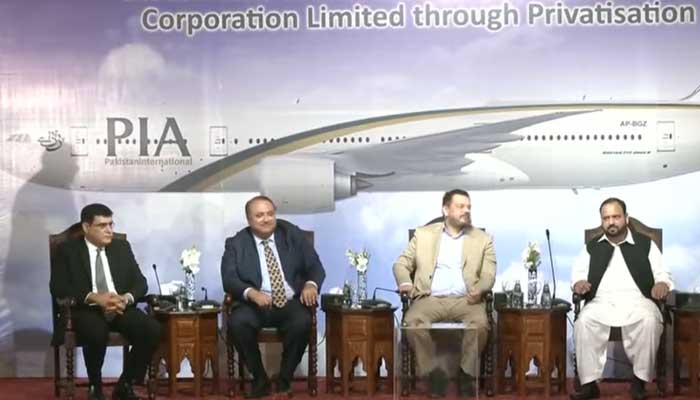PIA receives only Rs10bn bid for stake from lone bidder
Govt had set minimum expected price for PIA at Rs85 billion, says privatisation ministry
ISLAMABAD: The Pakistan International Airline (PIA) has received a Rs10 billion bid from lone bidder for a stake against the minimum price of Rs85 billion, set by the federal cabinet.
The government had pre-qualified six groups in June, but only one — real estate development company Blue World City — participated in the bidding process, placing a bid that is below the government-set minimum price of Rs85 billion Pakistani rupees.
The development comes as Prime Minister Shehbaz Sharif's administration is looking to offload a 51-100% stake in debt-ridden airline to raise funds and reform bleeding state-owned enterprises as envisaged under a $7 billion International Monetary Fund (IMF) programme.
The Privatisation Commission said it had asked the bidder to match the minimum bid.
However, the bidder stood by its bid, saying: "We wish the government all the best if they don’t want to accept our bid."
Mohammed Sohail, CEO of Topline Securities, said that the gap between the offer and reference price means the government would either need to consider this bid or revisit their strategy regarding the privatisation of the airline.
The bidding process was previously deferred by one month and was rescheduled from October 1 to October 31 (today).
Officials from three groups that chose not to bid told Reuters on condition of anonymity that there were concerns about the government's ability to stand by agreements made for the flag carrier in the long term.
One executive voiced concern about policy continuity once a new government came in. The government of Prime Minister Shehbaz Sharif has relied on a coalition of disparate political parties.
The disposal of PIA is a step former governments have steered away from as it has been highly unpopular given the number of layoffs that would likely result from it.
Underpinning these concerns over policy continuity and honouring contracts was the government's termination of power purchase contracts with five private companies earlier this month, as well as the process of re-negotiating other sovereign guaranteed pacts.
Changes in Pakistan's decade-old agreements with private IPP projects, largely financed by foreign lenders, to address chronic power shortages, "raises the risk of investing as well as doing business in Pakistan, even in the presence of sovereign contracts as well as guarantees," said Sakib Sherani, an economist who heads private firm Macro Economic Insights.
Other concerns raised by potential bidders included inconsistent government communication, unattractive terms and taxes on the sector, in addition to PIA's legacy issues and reputation.
-
Bitcoin crashes below $63K as regulatory pressure and market fears grow
-
Bitwise Crypto Industry innovators ETF: What investors should do in 2026?
-
Nintendo shares slide again as momentum fears grow
-
Gold, silver prices fallen sharply; What’s driving the drop?
-
Gold’s record climb: Experts question if its safety is ‘overstated’
-
Dubai unveils plans to construct street built with real gold
-
Netflix slams Paramount’s bid: 'Doesn't pass sniff test’ as Warner battle escalates
-
Ubisoft: Shares plunge amid restructuring plan and wave of games cancellations












